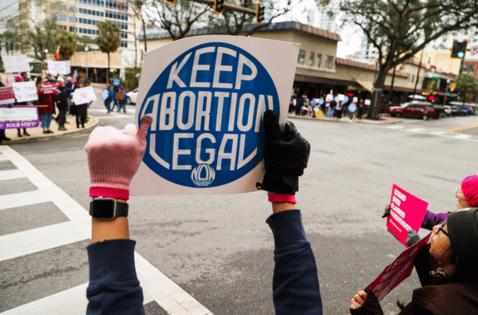Commentary: Abortion restrictions on young people cause trauma
Published in Political News
Recently, in our roles with nonprofit groups devoted to protecting human rights and reproductive justice, we interviewed an advocate who supported a pregnant high school senior through the difficult process of getting judicial permission to have an abortion without involving her parents, known as judicial bypass.
The teenage student knew that if her parents learned about the pregnancy, they would force her to continue it against her wishes. She dreamed of going to nursing school, and feared that becoming a mother at such a young age would rob her of that chance. So, with the advocate’s assistance, she went to court to request a judicial bypass. When the judge granted her petition, the advocate told us, “She just sobbed in the courtroom. She was just so relieved.”
Laws in over half of U.S. states require health care providers to notify or obtain consent from a parent or legal guardian before providing an abortion to anyone under 18. These laws make it difficult or even impossible for young people to get an abortion, even in states that have otherwise moved to protect and defend abortion access.
When young people have a close and trusting parental relationship, they often involve the parent in the process of seeking an abortion. Those who do not involve a parent often fear serious harm, such as being kicked out of their home or forced to continue a pregnancy against their will.
Young people unable to safely involve a parent have limited options. They can find a way to travel out of state for care, self-manage an abortion without their parents’ knowledge or support or ask a judge for permission to have an abortion.
But the process of seeking a judge’s permission can be humiliating and even traumatizing. In judicial bypass hearings, young people must demonstrate sufficient “maturity” to make decisions about their own bodies and futures. Judges evaluate their petitions based on arbitrary factors such as grade point average and extracurricular activities. One attorney told us that implicit in this process is projecting the image of “the good girl getting the abortion.”
We have researched these laws in many different states, from those with six-week abortion bans to those with constitutional amendments safeguarding abortion rights. Our latest jointly written new report focuses on six states — Colorado, Delaware, Georgia, Iowa, Montana and New Hampshire — which require parental notification but not consent, and have a judicial bypass process.
Across these states, we found that young people are being forced to remain pregnant or involve unsupportive parents who belittle or shame them. Providers say some parents have even asked them to withhold pain medication from young people during their abortions as “punishment.”
Judicial bypass is difficult to access and carries a heavy emotional toll. During hearings, young people must speak to deeply personal matters — their sexual behavior, potential side effects or complications of abortion and birth control plans. One attorney told us, “The client may be appearing before an older, male judge and need to talk about how many pads is too many pads to bleed through in an hour.” Some are forced to retell painful stories of estrangement, loss or sexual violence.
Some policymakers contend that parental notification is less onerous than parental consent, but we found the two are functionally equivalent. They grant parents, or a judge, de facto power to block a young person from getting an abortion. No one should have this power.
In 2021, lawmakers in Illinois repealed the state’s parental notification law. Now young people there can access abortion without being forced to involve unsupportive parents or face a judge.
As attacks on abortion intensify across the United States, lawmakers in other states should use their power to do away with harmful parental involvement laws.
Young people’s lives and futures are at stake.
____
Margaret Wurth is a senior researcher at Human Rights Watch. Katie Baylie is youth access counsel at If/When/How: Lawyering for Reproductive Justice. Both are co-authors of “Whose Abortion Is It? The Harms of State-Mandated Parental Notification for Abortion and Judicial Bypass in the United States.” This column was produced for Progressive Perspectives, a project of The Progressive magazine, and distributed by Tribune News Service.
_____
©2025 Tribune Content Agency, LLC.
























































Comments